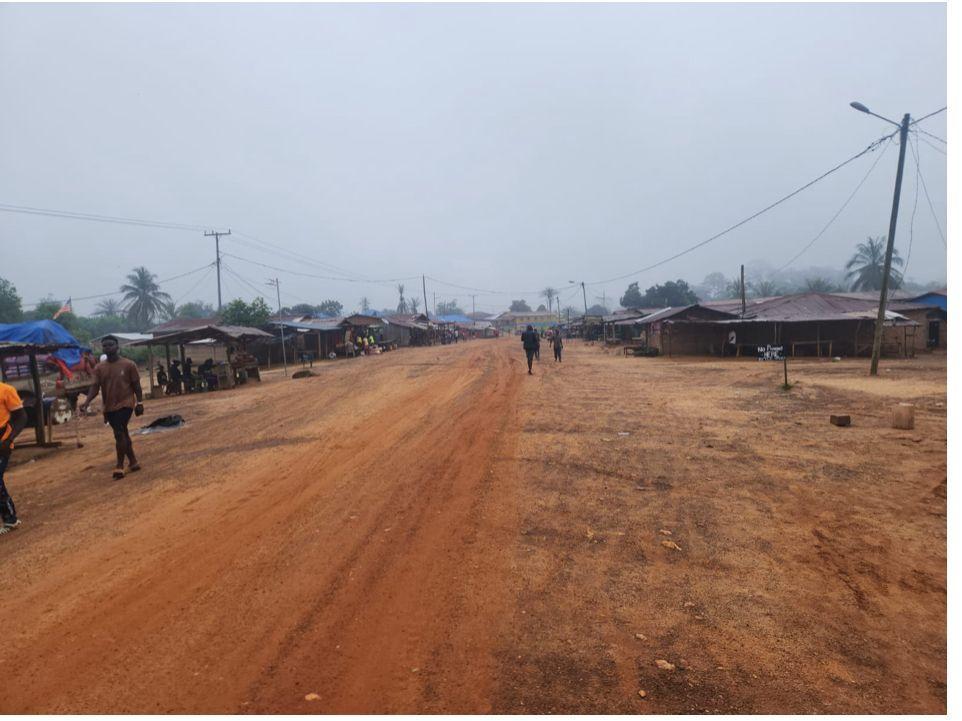Africa-Press – Liberia. A high-level media delegation is visiting Grand Gedeh County to probe into the growing wave of complex social, economic, and environmental issues related to increased migration and forest exploitation in that part of the country.
The visit, organized by a consortium of national journalists and civil society representatives, is aimed at digging deeper into mounting reports of deforestation, illegal land deals, and potential human rights violations in parts of the county bordering Côte d’Ivoire.
According to the Liberia Forest Media Watch (LFMW) – organizers of the trip, the media mission seeks to understand the multiple dimensions driving recent migration into forested communities and their implications for conservation and local livelihoods.
Among the key focus areas are deforestation, political manipulation in land and forest transactions, and growing government and private sector involvement in the cocoa trade.
Emerging reports suggest that thousands of acres of forestland in Grand Gedeh, some of which fall within or near the Krahn-Grebo National Park, are being cleared for cocoa farming, raising alarm among conservationists about the long-term environmental impact.
The journalists are expected to investigate allegations of land grabs for the sole purpose of cocoa cultivation, as well as growing demand to sell or purchase cocoa using the Ivorian currency, the CFA franc, which could undermine Liberia’s economic sovereignty and affect local trade regulation.
There had always been reported tensions between communities and families over forest ownership, as well as claims of child labor and human trafficking associated with cocoa production.
Adding to the controversy is the controversial lease agreement of a 500-acre forest, something which local residents say was done without their full consent or adequate consultation.
Stakeholders, including traditional leaders, local authorities, and representatives of the Forestry Development Authority (FDA), will be interviewed during the visit.
LFMW says the findings are expected to inform national policy discussions and draw attention to what some analysts describe as a “silent crisis” threatening both community stability and biodiversity conservation in southeastern Liberia.
The initiative is also being welcomed by environmental groups and rights advocates, who believe that reports arising from this visit could shed light on the complex interplay of migration, resource control, and political influence on the country’s forest against community rights to ownership.
Zwedru, Grand Gedeh County – A high-level media delegation is visiting Grand Gedeh County to probe into the growing wave of complex social, economic, and environmental issues related to increased migration and forest exploitation in that part of the country.
The visit, organized by a consortium of national journalists and civil society representatives, was aimed at digging deeper into mounting reports of deforestation, illegal land deals, and potential human rights violations in parts of the county bordering Côte d’Ivoire.
According to the Liberia Forest Media Watch (LFMW) – organizers of the trip, the media mission seeks to understand the multiple dimensions driving recent migration into forested communities and their implications for conservation and local livelihoods.
Among the key focus areas are deforestation, political manipulation in land and forest transactions, and growing government and private sector involvement in the cocoa trade.
Emerging reports suggest that thousands of acres of forestland in Grand Gedeh, some of which fall within or near the Krahn-Grebo National Park, are being cleared for cocoa farming, raising alarm among conservationists about the long-term environmental impact.
The journalists are expected to investigate allegations of land grabs for the sole purpose of cocoa cultivation, as well as growing demand to sell or purchase cocoa using the Ivorian currency, the CFA franc, which could undermine Liberia’s economic sovereignty and affect local trade regulation.
There had always been reported tensions between communities and families over forest ownership, as well as claims of child labor and human trafficking associated with cocoa production.
Adding to the controversy is the controversial lease agreement of a 500-acre forest, something which local residents say was done without their full consent or adequate consultation.
Stakeholders, including traditional leaders, local authorities, and representatives of the Forestry Development Authority (FDA), will be interviewed during the visit.
LFMW says the findings are expected to inform national policy discussions and draw attention to what some analysts describe as a “silent crisis” threatening both community stability and biodiversity conservation in southeastern Liberia.
The initiative is also being welcomed by environmental groups and rights advocates, who believe that reports arising from this visit could shed light on the complex interplay of migration, resource control, and political influence on the country’s forest against community rights to ownership.
For More News And Analysis About Liberia Follow Africa-Press






